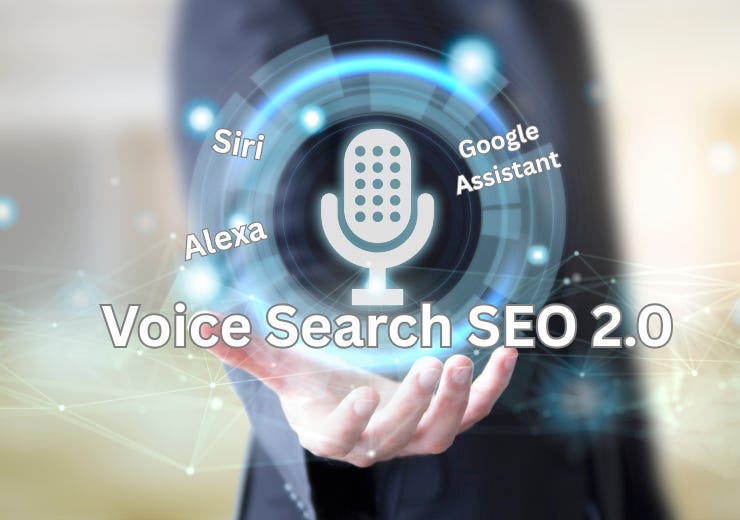🔊 Voice Search SEO 2.0: What Small Businesses Must Know Right Now
When we talk about “voice search,” it’s tempting to think of it as yesterday’s trend—but that would be a mistake. The latest from Search Engine Land (and the SEO world in 2025) shows that voice queries are evolving, intersecting with AI, and demanding a rethink of how we optimize for them.
But the good news? Voice SEO 2.0 doesn’t require a totally separate strategy. It builds on the same fundamentals you already (or should) be doing—just tuned for how people speak rather than type.
🔍 Voice Search + AI: The Shift You Can’t Ignore
Let’s set the stage with a few key points:
Voice queries tend to be longer, conversational, question-based, and context-rich. They often include location, time, urgency, or conditionals.
The rise of AI-driven search (with generative summaries, Overviews, etc.) means that many “voice” results will come from the same content pool that AI uses to generate answers.
Voice search results often manifest as zero-click answers or “answer reads” (the assistant or device speaks the result without sending the user to a webpage).
Measuring voice search performance is tricky—platforms rarely give you dedicated voice analytics. Instead, you infer via related metrics (impressions, featured snippet presence, conversational queries).
So your challenge is: how do you make sure you are the answer that gets spoken?
🛠️ Voice Search SEO 2.0: The Practical Moves That Matter
Here are the updated strategies that are working in 2025 to improve your odds of being spoken in voice/AI search:
Core Tactic
Why It Matters
What to Do Today
Conversational & Question-Style Phrasing
Voice assistants look for full natural queries.
Write in a what, how, where, why question formats. Use tools like AnswerThePublic / AlsoAsked to surface how people ask about your business.
Short, Direct Answers + Structured Format
The assistant wants something it can read aloud quickly.
Use bullet lists, numbered steps, succinct definitions (30-50 words). Put the answer early in your paragraphs.
Featured Snippets / Position Zero
Many voice responses map to the featured snippet.
Aim to appear as the short answer in SERPs. Format answer boxes and lists in your content.
Local Signals & “Near Me” Queries
Many voice searches are local (e.g. “coffee shop near me”).
Keep your Google Business Profile (GBP) accurate. Use LocalBusiness schema, include neighborhood names, show hours, reviews, maps.
Page Speed & Mobile Optimization
Voice users expect instant answers.
Use PageSpeed Insights, compress images, reduce redirects, lazy-load where possible.
Structured Data / Schema Markup
Helps search systems understand your content.
Add FAQ schema, LocalBusiness schema, speakable/schema for content sections where appropriate.
Content Refresh & Pruning
Stale or weak pages are less likely to rank or get quoted.
Regularly update your FAQ, service pages, blog posts. Remove or merge low-performing pages.
Testing & Listening
You won’t always see direct voice metrics, but you’ll see indicators.
These are not new ideas in SEO, but they have to be adapted for voice + AI search contexts now more than ever.
💡 What “Voice Search SEO 2.0” Means for Your Visibility Strategy
Don’t silo voice as a separate channel. Treat voice as an extension of your content and SEO strategy. The same pages you build for search should be voice-friendly.
Be the answer before the question is fully asked. Because many voice assistants “guess ahead,” the content they read might come from partial matches or intent signals. So anticipate how a user might speak, and write to that.
Focus on clarity, trust, and authority. Voice assistants rely on signals of trust: domain authority, quality content, structured data, reviews, and freshness. This echoes the “normal SEO still matters” thesis.
Use voice as a research tool. Run voice queries yourself on mobile / smart speakers. See which pages or answers are being surfaced. That gives you direct insight into competitor strengths, weak spots, and answer formulation techniques.
Don’t chase shallow hacks. You’ll see promises of “voice SEO tricks” or “hack your way into being spoken.” Be skeptical. Voice is a subset of search, not a magic loophole. The long game — quality content, good structure, local relevance — still wins.
Voice search and AI aren’t the future — they’re the filter deciding who gets found today.
Get ahead of the curve. Subscribe to the Local Visibility Pulse Report for practical, weekly strategies that make your business AI-visible, locally findable, and impossible to ignore.
👉 Share & Subscribe at localvisibilitypulsereport.com
or visit TheSmallBusinessGuru.com to see how we can optimize your visibility starting this month.


